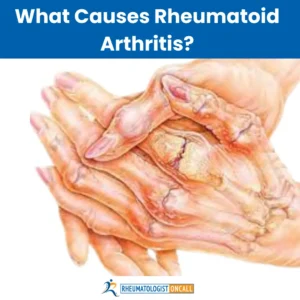SHARE
Rheumatoid Arthritis (RA) is an autoimmune disease. That means the immune system mistakenly attacks the body’s own tissues. Rheumatoid Arthritis (RA) targets the lining of joints, causing swelling, stiffness, and pain. Is there a cure for this inflammatory arthritis?
What Is Rheumatoid Arthritis?
With Rheumatoid Arthritis (RA), the immune system attacks the synovium – the membrane that lines the joints. This causes thickening and inflammation of the synovium. It’s called synovitis.
Over time, the inflamed synovium starts to damage cartilage and bone inside the joint. Ligaments and tendons that support the joint also become inflamed and stretched. This process can eventually lead to joint deformity and disability.
Rheumatoid Arthritis (RA) most often affects the smaller joints in the wrists, hands, and feet. The knees, ankles, elbows, hips, and shoulders can also be affected. In addition to joint pain and swelling, Rheumatoid Arthritis (RA) can cause fatigue, fever, eye problems, heart and lung issues, and hard lumps under the skin (rheumatoid nodules).
What Causes Rheumatoid Arthritis?

Experts don’t know the exact cause of Rheumatoid Arthritis. It likely results from a combination of genetic and environmental factors.
Research shows that some people inherit genes that make them more susceptible to developing autoimmune diseases like Rheumatoid Arthritis (RA). But not all with the genes get the disease. Other triggers like viruses, bacteria, smoking, and stress seem to play a role.
Together, these factors activate the immune system to attack the joints mistakenly.
Is There a Cure for Rheumatoid Arthritis?
Currently, there is no medical cure for rheumatoid arthritis. Some health gurus, so-called “autoimmune disease experts,” and social media influencers claim herbs, spices, or special diets (e.g., paleo, carnivore diet) can cure Rheumatoid Arthritis (RA).
But there’s no scientific proof these remedies work.
The good news is many treatments exist to manage Rheumatoid Arthritis by reducing inflammation and preventing joint damage. While not a cure, early effective treatment can induce remission when symptoms largely or completely disappear.
Treatments for Rheumatoid Arthritis
Common rheumatoid arthritis treatments include:
- Disease-modifying antirheumatic drugs (DMARDs) that suppress faulty immune responses. Methotrexate is most often prescribed first.
- Biologic agents like etanercept (Enbrel) or adalimumab (Humira) target parts of the immune system.
- Corticosteroids like prednisone rapidly reduce inflammation.
- Physical therapy and exercise to improve joint mobility and strengthen muscles.
- Assistive devices like canes or grab bars to protect joints.
- Surgery to repair joints severely damaged (e.g., knee replacement).
The goals are to control inflammation, relieve pain, slow joint damage, and maintain the ability to function. Starting treatment quickly and tailoring it to the individual offers the best results.
What Is the Outlook for Rheumatoid Arthritis?
The long-term outlook varies quite a bit from person to person. It depends on these factors:
- How early treatment begins – Starting DMARDs within three months of symptoms appearing gives the best chance of remission.
- Response to medications – Everyone responds differently to Rheumatoid Arthritis drugs. Finding the right mix is key.
- Disease severity – More joint damage accrues if it’s an aggressive form. Milder cases trend toward remission.
- Treatment adherence – Stopping meds leads to disease flares. Staying on DMARDs maintains low disease activity.
- Lifestyle habits – Quitting smoking, reducing stress, and good sleep hygiene improve the outlook. Lifestyle measures like diet, exercise, stress reduction, and restorative sleep help keep inflammation at bay.
While Rheumatoid Arthritis (RA) can’t be cured yet, working closely with a rheumatologist allows many patients to manage it well and prevent disability through today’s medical treatments.
If you seek a comprehensive approach incorporating nutrition, exercise, mindfulness, and cutting-edge therapies, consider calling us at Rheumatologist Oncall. We specialize in treating patients with Rheumatoid Arthritis, and we also offer prompt, affordable, high-quality medical consultations from the comfort of your home.














